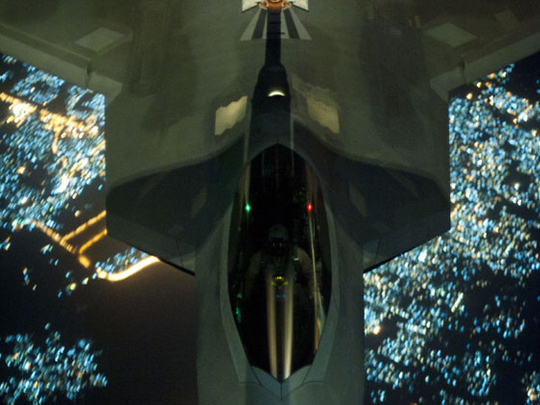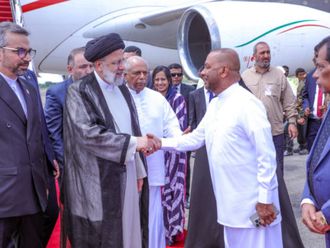
Beirut: The Daesh group is holding out in Syria after a week of being pounded by US-led air strikes, benefiting from its tactical flexibility, experts say.
While it is still too early to assess the full impact of the strikes that began on September 23, experts say Daesh militants have abandoned some of their most prominent positions.
They are now less visible, said Rami Abdul Rahman, director of the Syrian Observatory for Human Rights, a monitoring group.
“Before there were militant patrols through the towns they controlled, but today they have disappeared.”
At least in part this is because “the militants have blended in with the population,” he added.
At the same time, he said they had placed military equipment in civilian areas in the east of the country, angering locals.
Thomas Pierret, a Syria specialist at the University of Edinburgh, said such redeployments were not a major problem for Daesh.
“We’re not talking about a regular army, but rather a relatively flexible organisation that is not dependent on fixed infrastructure,” he said.
The strikes have so far killed around 200 militants, according to the Observatory, but have failed to stall Daesh progress towards Ain Al Arab, a strategic Kurdish town on the Syria-Turkey border.
The group has taken five more villages around the town since the strikes began and, on Monday, advanced to within five kilometres of it for the first time.
The coalition has bombed areas around the town, known as Kobane to the Kurds, but the raids do not appear to have halted the Daesh advance.
The group also continues to advance close to the Iraqi border, seizing territory in the eastern province of Hasakeh, according to the Observatory.
Is Daesh winning more support?
While Syria’s opposition National Coalition welcomed the strikes, experts say the raids have also bolstered support for Daesh in some quarters.
“The fact that it’s America that is carrying out strikes has pushed Syrian Islamists who detest IS to oppose the strikes and use the same terminology about a “crusader campaign against Islam,” Abdul Rahman said.
His group says more than 70 militants have joined Daesh since the strikes began.
While the United States leads the coalition, warplanes from Bahrain, Jordan, Qatar, Saudi Arabia and the UAE are also participating in the raids.
Daesh has faced a widespread backlash from a range of opposition groups since the beginning of the year, including Al Qaida’s Syrian affiliate Al Nusra Front.
But Aron Lund, editor of Syria in Crisis, a website run by the Carnegie Endowment for International Peace, said there was a limited “closing ranks” among militants.
“The conflict between IS [Daesh] and Al Qaida’s... [Al Nusra Front] franchise in Syria is really deep, but you do see some jihadi preachers and online propagandists that seem reluctant to criticise IS too harshly at a time when they’re in direct confrontation with the US.”
The strikes have also been criticised by opposition members for failing to target President Bashar Al Assad’s regime and for killing at least 22 civilians and hitting infrastructure, including a flour mill.
Some members of the opposition have also been angered by the targeting of Al Nusra because it has fought alongside other rebels in battles against both Al Assad and Daesh.
Have the raids hurt funding?
A number of coalition raids have targeted makeshift refineries in eastern Syria that experts and the US military say net Daesh around $2 million a day.
But some experts say the majority of the oil sold by Daesh is unrefined crude, extracted from several dozen wells that have not been targeted.
“These strikes will not affect its finances in a decisive fashion,” said Romain Caillet, an expert on militant movements.
The US-led coalition has also hit the entrance of the Conoco gas fields, which are key to electricity supply in Deir Al Zor and several other provinces, but is not a major source of revenue for the group, Caillet added.
Other sources of revenue include taxation and ransom from kidnappings, but it remains to be seen whether the strikes have disrupted the militants’ ability to collect those funds.
By targeting refineries along with a mill and grain silos, the coalition could be hoping to squeeze local supporters of IS [Daesh], hoping they “will rise up against it,” Caillet said.












